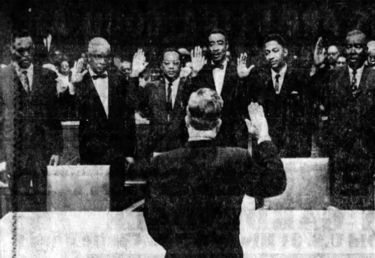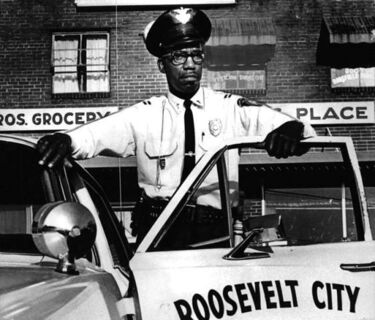Roosevelt City: Difference between revisions
No edit summary |
No edit summary |
||
| (5 intermediate revisions by the same user not shown) | |||
| Line 1: | Line 1: | ||
:''This article is about the former municipality. For the current Birmingham neighborhood, see [[Roosevelt]].'' | :''This article is about the former municipality. For the current Birmingham neighborhood, see [[Roosevelt]].'' | ||
'''Roosevelt City''' was a majority | [[File:1968 Roosevelt City officials.png|right|thumb|375px|The first class of Roosevelt City officials being sworn in in February 1968. From {{BPH}}.]] | ||
[[File:1970 Robert Smith Roosevelt City PD.jpg|right|thumb|375px|Robert Smith of the Roosevelt City Police Department in 1970]] | |||
'''Roosevelt City''' was a majority Black [[List of Jefferson County municipalities|incorporated municipality]] located between [[Midfield]], [[Lipscomb]], [[Brighton]] and [[Brownville]] to the southwest of [[Birmingham]]. | |||
Prior to 1967, the predominantly-Black communities of [[Roosevelt]], [[Cairo]], [[Roosevelt-Cairo Village]] and [[Brewerfield]] had made attempts to be annexed into one or another of its neighboring municipalities. When those efforts failed, a committee led by [[Calvin Smith]] and advised by attorney [[Orzell Billingsley]] helped the communities to pursue incorporation as a separate municipality. The group held weekly informational meetings ahead of a [[September 19]] vote. Organizers shared plans for the new city to develop playgrounds, garbage and sewer service, street improvements, and shopping facilities. | |||
Likely triggered by the move, the [[Alabama State Legislature]] passed [[Dominick Act|an amendment]] proposed by State Senator [[Richard Dominick]] of [[Homewood]] to restrict [[Jefferson County]] communities within three miles of another city from incorporating, but Roosevelt City completed the process on [[October 12]], [[1967]] before the new law could take effect. | |||
[[ | The first [[1968 Roosevelt City municipal election|municipal election]] was held on [[January 9]], [[1968]]. [[Freddie Rogers]] defeated four other candidates to become the city's first (and only) mayor. | ||
Roosevelt City held a special election on [[July 12]], [[1988]] and voted 718 to 404 to be annexed into [[Birmingham]]. The vote was contested, but it was upheld by the [[Alabama Supreme Court]] in August [[1989]]. | Roosevelt City sometimes derisively referred to as "Niggertown," was unable to secure services from neighboring cities, even though state law dictated that business taxes in the unincorporated area would be paid to the nearest municipality. | ||
The new city was more successful in securing federal grant funding to pay for new services such as police and fire departments and construction of a [[Roosevelt City Community Center]]. Rogers hoped to annex neighboring Lipscomb and other areas into the city, but those plans were never realized. Even so, with a population of 3,663 in [[1972]], Roosevelt City described itself as "the third-largest all-black city in the nation." | |||
In early [[1973]] the city purchased the former [[Fox Restaurant and Tourist Court]] on [[Bessemer Super Highway]], to be remodeled at a cost of $150,000 for use as a [[Roosevelt City Municipal Complex]]. City offices would relocate from the upper floor of a small building on [[Brighton Avenue]]. The new complex would also preserve the restaurant's kitchen and dining room, and have space for a municipal courtroom, housing authority. The tourist court would accommodate a fire station, police station, city jail, credit union, and lounge. | |||
That March Roosevelt City opened bids for a new [[Valley Creek Treatment Plant]], and began construction of low-income housing in Brewerfield. To avoid negative connotations, the housing project was designed to look like regular private homes and was not given a distinct name. In July the city began construction of a medical clinic. | |||
Over time, Roosevelt city's anemic tax base threatened to bankrupt the city. Residents held a special election on [[July 12]], [[1988]] and voted 718 to 404 to be annexed into [[Birmingham]]. The vote was contested, but it was upheld by the [[Alabama Supreme Court]] in August [[1989]]. | |||
==Mayors== | |||
* [[Freddie Rogers]], 1967–1988 | |||
==References== | ==References== | ||
* Barclift, William (September 22, 1967) "[https://www.newspapers.com/clip/116447220/all-negro-roosevelt-city-created-for-ou/ All-Negro Roosevelt City Created 'For Our Children'] {{BPH}}, p. 24 - via Newspapers.com | |||
* Douglas, Carlyle C. (August 1970) "[http://books.google.com/books?id=QrBv5xmgHfMC&lpg=PA104&pg=PA100#v=onepage&q&f=false Incorporation: A New Tactic For Saving Black Areas]." ''Ebony'' Vol. 25, No. 10, pp. 100-105 | * Douglas, Carlyle C. (August 1970) "[http://books.google.com/books?id=QrBv5xmgHfMC&lpg=PA104&pg=PA100#v=onepage&q&f=false Incorporation: A New Tactic For Saving Black Areas]." ''Ebony'' Vol. 25, No. 10, pp. 100-105 | ||
* Welch, Adrienne (January 12, 1973) "[https://www.newspapers.com/clip/116444952/roosevelt-city-buys-building-for-complex/ Roosevelt City buys building for complex]" {{BPH}} - via Newspapers.com | |||
* Bennighof, Mike (May 1, 1986) "[https://www.newspapers.com/clip/116446197/dominick-act-challenge-to-turn-on-issue/ Dominick Act challenge to turn on issue of Center Point]" {{BPH}}, p. A6 - via Newspapers.com | |||
[[Category:Roosevelt]] | [[Category:Roosevelt]] | ||
Latest revision as of 14:32, 14 January 2023
- This article is about the former municipality. For the current Birmingham neighborhood, see Roosevelt.

Roosevelt City was a majority Black incorporated municipality located between Midfield, Lipscomb, Brighton and Brownville to the southwest of Birmingham.
Prior to 1967, the predominantly-Black communities of Roosevelt, Cairo, Roosevelt-Cairo Village and Brewerfield had made attempts to be annexed into one or another of its neighboring municipalities. When those efforts failed, a committee led by Calvin Smith and advised by attorney Orzell Billingsley helped the communities to pursue incorporation as a separate municipality. The group held weekly informational meetings ahead of a September 19 vote. Organizers shared plans for the new city to develop playgrounds, garbage and sewer service, street improvements, and shopping facilities.
Likely triggered by the move, the Alabama State Legislature passed an amendment proposed by State Senator Richard Dominick of Homewood to restrict Jefferson County communities within three miles of another city from incorporating, but Roosevelt City completed the process on October 12, 1967 before the new law could take effect.
The first municipal election was held on January 9, 1968. Freddie Rogers defeated four other candidates to become the city's first (and only) mayor.
Roosevelt City sometimes derisively referred to as "Niggertown," was unable to secure services from neighboring cities, even though state law dictated that business taxes in the unincorporated area would be paid to the nearest municipality.
The new city was more successful in securing federal grant funding to pay for new services such as police and fire departments and construction of a Roosevelt City Community Center. Rogers hoped to annex neighboring Lipscomb and other areas into the city, but those plans were never realized. Even so, with a population of 3,663 in 1972, Roosevelt City described itself as "the third-largest all-black city in the nation."
In early 1973 the city purchased the former Fox Restaurant and Tourist Court on Bessemer Super Highway, to be remodeled at a cost of $150,000 for use as a Roosevelt City Municipal Complex. City offices would relocate from the upper floor of a small building on Brighton Avenue. The new complex would also preserve the restaurant's kitchen and dining room, and have space for a municipal courtroom, housing authority. The tourist court would accommodate a fire station, police station, city jail, credit union, and lounge.
That March Roosevelt City opened bids for a new Valley Creek Treatment Plant, and began construction of low-income housing in Brewerfield. To avoid negative connotations, the housing project was designed to look like regular private homes and was not given a distinct name. In July the city began construction of a medical clinic.
Over time, Roosevelt city's anemic tax base threatened to bankrupt the city. Residents held a special election on July 12, 1988 and voted 718 to 404 to be annexed into Birmingham. The vote was contested, but it was upheld by the Alabama Supreme Court in August 1989.
Mayors
- Freddie Rogers, 1967–1988
References
- Barclift, William (September 22, 1967) "All-Negro Roosevelt City Created 'For Our Children' Birmingham Post-Herald, p. 24 - via Newspapers.com
- Douglas, Carlyle C. (August 1970) "Incorporation: A New Tactic For Saving Black Areas." Ebony Vol. 25, No. 10, pp. 100-105
- Welch, Adrienne (January 12, 1973) "Roosevelt City buys building for complex" Birmingham Post-Herald - via Newspapers.com
- Bennighof, Mike (May 1, 1986) "Dominick Act challenge to turn on issue of Center Point" Birmingham Post-Herald, p. A6 - via Newspapers.com
